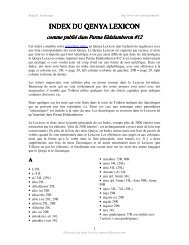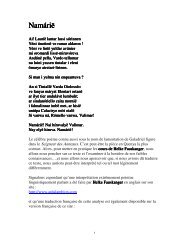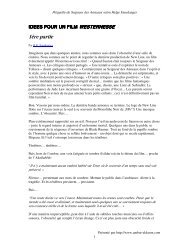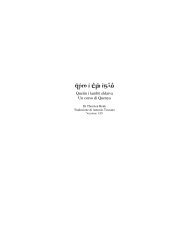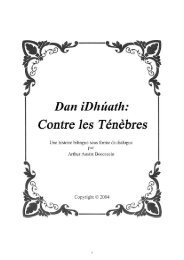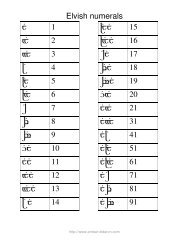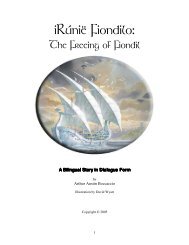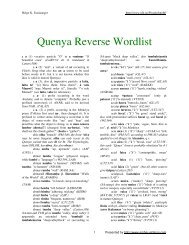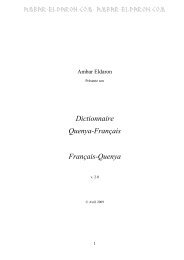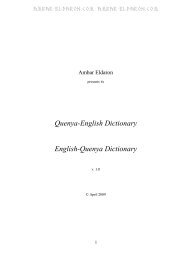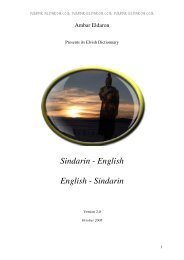English – Quenya - Ambar Eldaron
English – Quenya - Ambar Eldaron
English – Quenya - Ambar Eldaron
You also want an ePaper? Increase the reach of your titles
YUMPU automatically turns print PDFs into web optimized ePapers that Google loves.
Helge K. Fauskanger http://www.uib.no/People/hnohf/<br />
LASTING vórë (adj.?), also vórëa<br />
(continuous, enduring); LASTING QUALITY<br />
voronwië (endurance) <strong>–</strong>VT45:7, BORÓN<br />
LATE telwa (last) <strong>–</strong>LT1:267<br />
LAUGH lala- <strong>–</strong>PM:359 cf. 343. (Note: a<br />
homophone means "deny".) Past tense perhaps<br />
*landë, given the derivation stated (whereas lala<br />
"deny" might have the past tense *lalanë or<br />
*lallë).<br />
LAW sanyë (Þ) (rule), axan (rule,<br />
commandment, as proceeding primarily from<br />
Eru; pl. axani is attested); LAW-ABIDING sanya<br />
(Þ) (normal, regular) (variant vorosanya with a<br />
prefixed element meaning "ever"). <strong>–</strong>STAN,<br />
WJ:399, VT39:30, 23, VT46:16<br />
LAWN palis (sward) <strong>–</strong>LT1:264<br />
LAY lirilla (song) <strong>–</strong>LT1:258<br />
LEAD tulya- (+ allative: lead into). Another<br />
form of similar meaning, mittanya-, was possibly<br />
abandoned by Tolkien. <strong>–</strong>VT43:22<br />
LEAD (the metal) canu, LEADEN canuva<br />
<strong>–</strong>LT1:268<br />
LEAF lassë (pl. lassi is attested); HAVING<br />
MANY LEAVES lillassëa (pl lillassië is<br />
attested); COLLECTION OF LEAVES olassië<br />
(foliage); PUT FORTH LEAVES OR FLOWERS<br />
*lohta- (altered from the actual reading lokta<br />
because Tolkien later decided that kt became ht<br />
in <strong>Quenya</strong>) (sprout). LEAF-SHAPED<br />
lassecanta; LEAF-FALL lasselanta (autumn or<br />
the beginning of winter; see also FADING);<br />
LEAF-GREY lassemista <strong>–</strong>LAS 1 , Nam, VT39:9,<br />
LT1:254, MC:222, 223, Letters:282, LT1:258,<br />
KAT, LotR:505 cf. Letters:224<br />
LEAGUE lár (basic meaning "pause" <strong>–</strong> in<br />
marches a brief halt was made for each league).<br />
A lár was defined as five thousand rangar; see<br />
YARD. A ranga was approximately 38 inches, so<br />
a lár was "5277 yards, two feet and four inches<br />
[ca. 4826 meters], supposing the equivalence to<br />
be exact" <strong>–</strong> close enough to our league of 5280<br />
yards to justify this translation. <strong>–</strong>UT:285<br />
LEANING talta (sloping, tilted) <strong>–</strong>TALÁT<br />
LEAP cap- (jump); halta-; LEAPING<br />
(noun) haloitë (pl. haloisi is attested) <strong>–</strong><br />
PE16:134, LT1:254<br />
LEARN #par- (acquire information, not by<br />
experience or observation, but by<br />
communication, by the instruction, or by written<br />
accounts, of others). Paranyë (apárien)<br />
parmanen, “I am learning (have learnt) by<br />
means of a book” <strong>–</strong>PE17:180<br />
LEARNED istima (wise, having<br />
knowledge), nóla (wise). (In Etym, the latter<br />
word is spelt with initial ñ, that is, ng. Initial ng<br />
had become n in Third Age <strong>Quenya</strong>, and I follow<br />
the system of LotR and transcribe it accordingly.<br />
Cf. also the spelling of the related word nólë in<br />
Silm:432. But if this word is written in Tengwar,<br />
the initial n should be transcribed with the letter<br />
noldo, not númen.) LEARNED MAN istyar<br />
(scholar) <strong>–</strong>IS, ÑGOL<br />
LEATHER (dressed leather) alu <strong>–</strong>QL:30<br />
LEAVE (vb) auta- (go away, pass), pa.t.<br />
oantë, oantië (in the physical sense "went away<br />
[to another place]") or vánë ("the most frequently<br />
used past [tense]" <strong>–</strong> less "physical" than oantë,<br />
meaning "disappeared" rather than "went<br />
away"), perf. avánië (pl avánier is attested);<br />
perf. vánië with no augment may occur in verse.<br />
For "leave", Etym also has lesta, pa.t. lendë;<br />
this is also the past tense of "go". The stem from<br />
which lesta- is derived was "replaced" by<br />
another. Lesta has a wholly different meaning in<br />
later writings; see GIRDLE, MEASURE. LEAVE<br />
OUT hehta- (pa.t. hehtanë is given but seems<br />
perfectly regular) (put aside, exclude, abandon,<br />
forsake) <strong>–</strong>WJ:366, ELED<br />
LEAVE (noun) <strong>–</strong> with leave of: lenémë (+<br />
genitive)<br />
LEFT hyarya; LEFT HAND hyarma,<br />
LEFT-HANDED hyarmaitë (stem *hyarmaiti-) <strong>–</strong><br />
KHYAR, VT47:6<br />
LEG telco (pl. telqui) (stem) <strong>–</strong>TELÉK<br />
LEGENDARIUM OF THE FATHERS OF<br />
MEN Atanatárion (lit. simply "of the Fathers of<br />
Men") <strong>–</strong>MR:373<br />
LEGOLAS Laiqualassë <strong>–</strong>LT1:267<br />
LEMBAS coimas (life-bread) (prob.<br />
coimast[a]-, cf. masta "bread") (life-bread) <strong>–</strong><br />
Silm:406/429<br />
LENGTHENED taina (extended,<br />
stretched, elongated); LENGTHENING tailë<br />
(extension) <strong>–</strong>TAY cf. VT39:7<br />
LESS mis (adverb); suffix <strong>–</strong>LESS <strong>–</strong>lóra (=<br />
"without"; this <strong>–</strong>lóra is a suffix used to derive<br />
adjectives; Tolkien gave the example ómalóra<br />
"voiceless"). The earlier "Qenya" suffix <strong>–</strong>viltë, <strong>–</strong><br />
valta of similar meaning may not be valid in<br />
LotR-style <strong>Quenya</strong>. <strong>–</strong>PE14:80, VT45:28, GL:23<br />
LESSEN píca (part. #pícala is attested)<br />
(dwindle) <strong>–</strong>MC:223, 222<br />
LET (see ALLOW); LET GO lerya<br />
(release, set free), LET GO or LET LOOSE sen-<br />
(to free). LET IT BE THAT nái (in Namárië: nai;<br />
the editor conjectures that nái is an etymological<br />
form, VT49:36). <strong>–</strong>VT41:5, 6; VT43:18, VT49:28<br />
LETTER tengwa (pl. tengwar is attested;<br />
this word was used primarily of the Fëanorian<br />
letters. However, the term "Tengwar of Rúmil"<br />
occurring in LotR:1151 seems to indicate that the<br />
word tengwa can indeed be used of a letter of<br />
Wordlist last updated July 5th, 2008 48 Presented by http://www.ambar-eldaron.com



